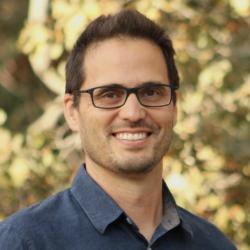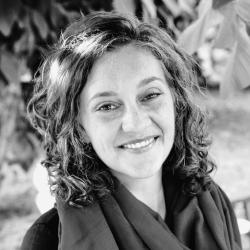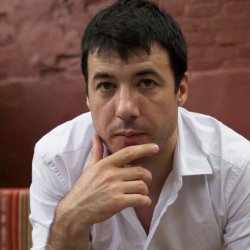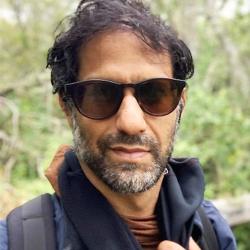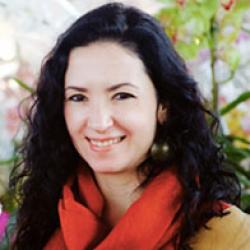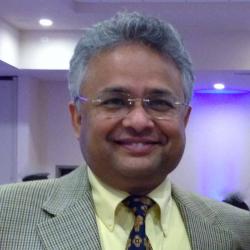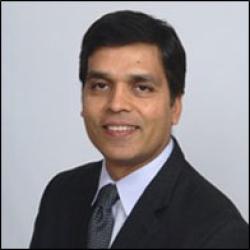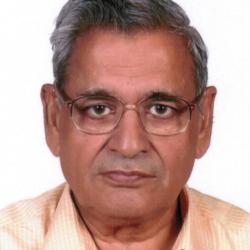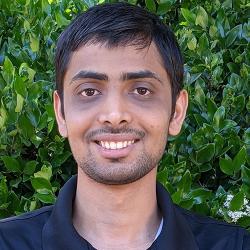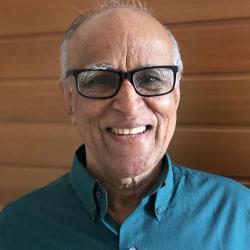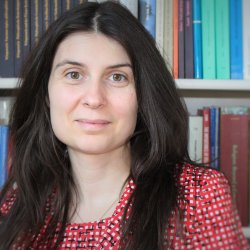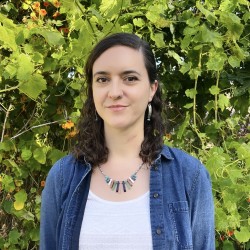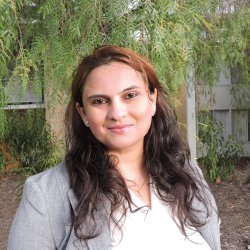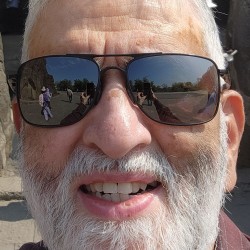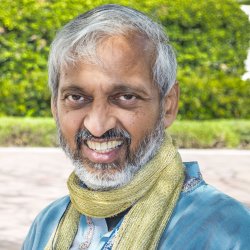Christopher Miller, PhD
MA Faculty Vice President of Academic Affairs, Professor of Jain & Yoga Studies
Christopher Jain Miller, the co-founder and Vice President of Academic Affairs at Arihanta Institute, completed his PhD in the Study of Religion at the University of California, Davis. He is Professor of Jain and Yoga Studies at Arihanta Institute, Visiting Researcher at the University of Zürich's Asien-Orient-Institut, and Adjunct Professor at Claremont School of Theology. Christopher's primary fields of research interest are Yoga Studies and Engaged Jain Studies, and he currently serves as the co-chair of the Yoga in Theory and Practice Unit at the American Academy of Religion as well as on the steering committees for the Dharma Academy of North America (DANAM) and the Yoga Darśana Yoga Sādhana conference. Christopher is the author of Embodying Transnational Yoga: Eating, Singing, and Breathing in Transformation (Routledge 2024) and the co-editor of Engaged Jainism: Critical and Constructive Studies of Jain Social Engagement (SUNY 2025) as well as Beacons of Dharma: Spiritual Exemplars for the Modern Age (Lexington 2020).
Learn More
Cogen Bohanec, MA, PhD
MA Faculty Assistant Professor in Sanskrit & Jain Studies, Arihanta Institute
Cogen Bohanec currently holds the position of Assistant Professor in Sanskrit and Jain Studies at Arihanta Institute where he teaches various courses on Jain philosophy and its applications. In addition, he is an Adjunct Assistant Professor at Claremont School of Theology (CST) where he teaches Sanskrit and Gujarati, and he has taught numerous classes on South Asian Culture & Religions and Sanskrit language at the Graduate Theological Union (GTU) in Berkeley. Dr. Bohanec specializes in the Jain and Hindu traditions, comparative dharma traditions, philosophy of religion, theo-ethics (virtue ethics, and environmental and animal ethics in particular), and Sanskrit language and literature, and has numerous publications in those areas, particularly in the fields of Jain and Hindu Studies amongst other disciplines. He has a PhD in “Historical and Cultural Studies of Religion” with an emphasis in Hindu Studies from GTU, where his research emphasized ancient Indian languages, literature, and philosophical systems. He also holds an MA in Buddhist Studies from the Institute of Buddhist Studies at GTU where his research primarily involved translations of Pāli Buddhist scriptures in conversation with the philology of the Hindu Upaniṣads. He is the author of “Bhakti Ethics, Emotions and Love in Gauḍīya Vaiṣṇava Metaethics” (Lexington, 2024), an interdisciplinary study that frames traditional Hindu themes of ecotheology, ecofeminist theology, feminist care ethics, within a framework of virtue ethics in conversation with a bhakti-based psychology of emotions. Currently he is largely engaged in publication and research on various aspects of the Jain tradition, emphasizing translations and analyses of Jain Sanskrit, Prakrit, and Gujarati texts, but is also publishing academic works on various topics within the Hindu tradition.
Learn More
Jonathan Dickstein, PhD
MA Faculty Tirthankara Shreyansanath Endowed Assistant Professor of Jain and Vegan Studies, Arihanta Institute
Jonathan Dickstein, PhD, the Tirthankara Shreyansanath Endowed Assistant Professor of Jain and Vegan Studies at Arihanta Institute, specializes in South Asian Religions, Religion and Ecology, and Comparative Religious Ethics. He received his doctoral degree in Religious Studies from the University of California, Santa Barbara, where he wrote his dissertation on ancient Indian animal taxonomies and their relevance for religious ritual and dietary practice. Jonathan’s current work focuses on Jainism and contemporary ecological issues, and accordingly extends into Critical Animal Studies, Food Studies, and Diaspora Studies.
Jonathan has published in a wide array of interdisciplinary journals on topics such as veganism and politics, yoga and diet, Jain veganism, and the ethic of nonviolence (ahiṃsa). Jonathan considers himself a scholar-practitioner, having spent many years not only in libraries but also in public advocating for justice for both humans and nonhumans alike.
Learn More
Jonathan has published in a wide array of interdisciplinary journals on topics such as veganism and politics, yoga and diet, Jain veganism, and the ethic of nonviolence (ahiṃsa). Jonathan considers himself a scholar-practitioner, having spent many years not only in libraries but also in public advocating for justice for both humans and nonhumans alike.
Affiliated Faculty
Dr. Jeffery D. Long is the Carl W. Zeigler Professor of Religion, Philosophy, and Asian Studies at Elizabethtown College, in Elizabethtown, Pennsylvania, where he has taught since receiving his PhD from the University of Chicago Divinity School in the year 2000. He is the author, editor, or co-editor of twelve books, including Hinduism in America: A Convergence of Worlds, which won the Rajinder and Jyoti Gandhi Award for Excellence in Theology, Philosophy, and Critical Reflection from the Dharma Academy of North America in 2022. His latest book is Discovering Indian Philosophy: An Introduction to Hindu, Jain, and Buddhist Thought. His work focuses primarily on the religions and philosophies of India, mainly the Hindu, Jain, and Buddhist traditions, and on such themes as nonviolence, pluralism and its metaphysical foundations, the pedagogy of teaching Indic traditions in a Western context, religion and popular culture, and the concept of rebirth. In 2021, he received an award from the International Ahimsa Foundation for his efforts to promote nonviolence through scholarship. In the same year, he received the Ranck Award for Research Excellence from Elizabethtown College. He has spoken three times at the United Nations and appears in documentaries for PBS and the History Channel.
Learn More
Dr. Benjamin Zenk is Instructor of Management in the College of Business and Economics at the University of Hawaii at Hilo in the United States. There, he teaches critical thinking, business ethics, environmental ethics, and introductory business. Dr. Zenk also works with the university's department of philosophy where he has taught intro to philosophy, ethics, reasoning, symbolic logic, histories of Indian and Buddhist philosophy, and comparative philosophy. He received his PhD in philosophy from the University Hawaii at Manoa in 2018 on the topic of cross-cultural philosophical disagreement. Prior to this, he received an M.A. in philosophy from the University of Hawaii at Manoa and a bachelor’s degree in philosophy from Loyola Marymount University (LMU). Dr. Zenk utilizes a broad array of cross-cultural and interdisciplinary materials in his business and management courses, stemming from his studies of world philosophy, logic, and ethics, as well as both German and Sanskrit language and literature. His work has led to many months of language and cultural research and study in both Germany and India.
Learn More
Ellen Gough, PhD, is an assistant professor in the Department of Religion at Emory University. She received a PhD in Asian Religions from Yale University in 2015.
Most of her research takes an ethno-historical approach that combines the study of Gujarati, Hindi, Sanskrit, and Prakrit texts, the study of material culture, and fieldwork. Her book, Making a Mantra: Tantric Ritual and Renunciation on the Jain Path to Liberation (University of Chicago Press, 2021), examines the life of a single Jain mantra, from its origin at the outset of the first millennium, to its use in medieval mendicant initiations and meditative exercises, to its use in healing rites today. She is now working on projects related to Digambara festivals and Jain astrology.
Learn More
Most of her research takes an ethno-historical approach that combines the study of Gujarati, Hindi, Sanskrit, and Prakrit texts, the study of material culture, and fieldwork. Her book, Making a Mantra: Tantric Ritual and Renunciation on the Jain Path to Liberation (University of Chicago Press, 2021), examines the life of a single Jain mantra, from its origin at the outset of the first millennium, to its use in medieval mendicant initiations and meditative exercises, to its use in healing rites today. She is now working on projects related to Digambara festivals and Jain astrology.
Brianne Donaldson, PhD Brianne holds the Shri Parshvanath Presidential Chair in Jain Studies at University of California, Irvine.
Brianne explores the implicit foundational beliefs that inform social inclusion and ethical action toward plants, animals, and marginalized people. She is the author of Creaturely Cosmologies: Why Metaphysics Matters for Animal and Planetary Liberation (2015) exploring Jainism and Whitehead’s process philosophy, and Insistent Life: Principles for Bioethics in the Jain Tradition (2021, co-authored with Ana Bajželj). She is the editor of Beyond the Bifurcation of Nature: A Common World for Animals and the Environment (2014), The Future of Meat Without Animals (2016; co-edited with Christopher Carter), and Feeling Animal Death: Being Host to Ghosts (2019; co-edited with Ashley King). Brianne holds the Shri Parshvanath Presidential Chair in Jain Studies at University of California, Irvine.
Learn More
Brianne explores the implicit foundational beliefs that inform social inclusion and ethical action toward plants, animals, and marginalized people. She is the author of Creaturely Cosmologies: Why Metaphysics Matters for Animal and Planetary Liberation (2015) exploring Jainism and Whitehead’s process philosophy, and Insistent Life: Principles for Bioethics in the Jain Tradition (2021, co-authored with Ana Bajželj). She is the editor of Beyond the Bifurcation of Nature: A Common World for Animals and the Environment (2014), The Future of Meat Without Animals (2016; co-edited with Christopher Carter), and Feeling Animal Death: Being Host to Ghosts (2019; co-edited with Ashley King). Brianne holds the Shri Parshvanath Presidential Chair in Jain Studies at University of California, Irvine.
Professor Atul K. Shah has a PhD from the London School of Economics and is author of ‘Inclusive and Sustainable Finance’ (Routledge 2022), ‘Jainism and Ethical Finance’ (with Aidan Rankin, Routledge 2017); The Politics of Financial Risk, Audit and Regulation (Routledge 2018) Reinventing Accounting and Finance Education (Routledge 2018), ‘Celebrating Diversity’ (2007) and ‘Boardroom Diversity – The Opportunity’ (2010).
He is passionate about Business Ethics, Education Reform and Diversity. Dr. Shah has published a number of papers in international academic journals such as Accounting, Organizations and Society; Accounting, Auditing and Accountability Journal; European Accounting Review; Journal of Financial Regulation and Compliance; Business Ethics – A European Review.
Between 1995 and 1998, he published a series of papers predicting the global financial crisis, focusing in particular on derivatives and systemic risk, and regulatory arbitrage.
His work has been profiled in BBC and Forbes and Dr. Shah is presently working on a series of projects around financial risk management, diverse ethics and regulation. He has Broadcast experience, with credits including BBC Radio 4, BBC World Service, Channel 4, Five Live, BBC Radio 2, Guardian and BBC Asian Network. Professor Shah also writes and comments for the Financial Times.
In 2010 Professor Shah embarked on a historic 1500 mile Masala Tour of Britain, to showcase the depth and breadth of the diversity in Britain and help the country improve its cultural intelligence – this was featured in the Guardian. The tour was also widely covered on BBC radio nationally.
Presently he is writing a new book for Routledge on ‘Inclusive’ Accounting and Finance Leadership, a theme which is virtually absent from the business literature.
He is also a top Business Ethics writer for The Conversation and his research on global accounting won the Best Paper award in 2019.
Learn More
He is passionate about Business Ethics, Education Reform and Diversity. Dr. Shah has published a number of papers in international academic journals such as Accounting, Organizations and Society; Accounting, Auditing and Accountability Journal; European Accounting Review; Journal of Financial Regulation and Compliance; Business Ethics – A European Review.
Between 1995 and 1998, he published a series of papers predicting the global financial crisis, focusing in particular on derivatives and systemic risk, and regulatory arbitrage.
His work has been profiled in BBC and Forbes and Dr. Shah is presently working on a series of projects around financial risk management, diverse ethics and regulation. He has Broadcast experience, with credits including BBC Radio 4, BBC World Service, Channel 4, Five Live, BBC Radio 2, Guardian and BBC Asian Network. Professor Shah also writes and comments for the Financial Times.
In 2010 Professor Shah embarked on a historic 1500 mile Masala Tour of Britain, to showcase the depth and breadth of the diversity in Britain and help the country improve its cultural intelligence – this was featured in the Guardian. The tour was also widely covered on BBC radio nationally.
Presently he is writing a new book for Routledge on ‘Inclusive’ Accounting and Finance Leadership, a theme which is virtually absent from the business literature.
He is also a top Business Ethics writer for The Conversation and his research on global accounting won the Best Paper award in 2019.
Jan Dutkiewicz is Assistant Professor in the School of Social Science and Cultural Studies at the Pratt Institute and a Contributing Writer at Vox. He has written about the politics of food for The New Republic, The Guardian, The Washington Post, WIRED and The Wall Street Journal.
Learn More
Renan Larue is a professor, French literary scholar, and historian of vegetarianism. He is the author of six books on animal rights, vegetarianism or veganism, including Le végétarisme et ses ennemis (Presses Universitaires de France, 2015), a history of vegetarianism from Pythagoras until the modern day. The French Academy awarded it Best Book of the year in Moral Philosophy. More recently, he published Anthologie végane: 100 textes essentiels (Presses Universitaires de France, 2023). In 2016, he offered the first course in Vegan Studies in the United States at the University of California, Santa Barbara.
Learn More
Dr. Vasile Stanescu received his Ph.D. from Stanford University in the program of Modern Thought and Literature. He is an Associate Professor of Communication Studies at Mercer University. Dr. Stanescu is the co-founder and former co-Senior Editor of the Critical Animal Studies Book Series published by Brill/Rodopi Press, and a co-founder of the North American Association for Critical Animal Studies (NAACAS). He has also served on the editorial collective for the Journal for Critical Animal Studies and co-organized the Stanford Environmental Humanities Project. He is currently a member of the Climate Social Science Network (CSSN) based out of Brown University.
A pioneer in the field of Critical Animal Studies, Dr. Stanescu has over 25 peer-reviewed publications on the study of animals and the environment. His work has been featured in journals such as the American Behavioral Scientist, The Journal of American Culture, Animal Studies Journal, and the Journal for Critical Animal Studies. His research has been recognized by numerous institutions, including The Woods Institute for the Environment, Minding Animals International, The Andrew Mellon Foundation, the Culture and Animals Foundation, the Institute for Critical Animal Studies, and the Institutul Cultural Român. A committed advocate for animal liberation, Dr. Stanescu has been vegan for over 20 years.
Learn More
A pioneer in the field of Critical Animal Studies, Dr. Stanescu has over 25 peer-reviewed publications on the study of animals and the environment. His work has been featured in journals such as the American Behavioral Scientist, The Journal of American Culture, Animal Studies Journal, and the Journal for Critical Animal Studies. His research has been recognized by numerous institutions, including The Woods Institute for the Environment, Minding Animals International, The Andrew Mellon Foundation, the Culture and Animals Foundation, the Institute for Critical Animal Studies, and the Institutul Cultural Român. A committed advocate for animal liberation, Dr. Stanescu has been vegan for over 20 years.
Anand Jayprakash Vaidya is a professor of philosophy at San Jose State University and occasionally directs the Center for Comparative Philosophy. He was trained as an analytic philosopher from 1996 – 2005. His 2005 dissertation, The Epistemology of Metaphysical Modality, was a critical study of how we know what is possible and necessary via conceivability.
Anand works primarily in the areas of cross-cultural and multi-disciplinary philosophy of mind, epistemology, critical thinking, and ethics. His primary interest in this area is on Indo-Anglo-Analytic philosophy that engages cognitive science. He has taught many courses from Asian philosophy to ethical theory to logical theory. In addition to regularly teaching in his research areas, he also teaches business ethics, the philosophy of economics, and theories of justice. He is the co-editor of Business in Ethical Focus: An Anthology, 2nd Edition (Broadview Press, 2016). Visit Anand’s website to learn more.
Learn More
Anand works primarily in the areas of cross-cultural and multi-disciplinary philosophy of mind, epistemology, critical thinking, and ethics. His primary interest in this area is on Indo-Anglo-Analytic philosophy that engages cognitive science. He has taught many courses from Asian philosophy to ethical theory to logical theory. In addition to regularly teaching in his research areas, he also teaches business ethics, the philosophy of economics, and theories of justice. He is the co-editor of Business in Ethical Focus: An Anthology, 2nd Edition (Broadview Press, 2016). Visit Anand’s website to learn more.
Patricia received her doctorate and master’s degree in Religious Studies from Pontifical Catholic University of Sao Paulo, Brazil, where she is currently a Professor of Religious Studies. Her dissertation was on Material Religion, a method to study religions from their empirical aspects, involving iconography, architecture, music, clothing, food and other bodily practices.
Her master’s degree’s research was about food practices and foodways in comparative religions. She is the author of the book Religion at the table. A sample of religions and their food practices, 2015 published in Portuguese, as well as of many other papers and book chapters.
Learn More
Her master’s degree’s research was about food practices and foodways in comparative religions. She is the author of the book Religion at the table. A sample of religions and their food practices, 2015 published in Portuguese, as well as of many other papers and book chapters.
Alba Rodríguez Juan is a PhD Candidate at the University of California, Riverside (UCR). She earned her degree in Psychology from the University of Valencia, Spain, and completed a master’s in Yoga Studies at Loyola Marymount University with the support of a two-year Fulbright scholarship. Alba has worked as a mentor, counselor, and yoga teacher in different settings, including hospitals and academic institutions. Currently, she works as a Teaching Assistant in the Department for the Study of Religion at the University of California, Riverside (UCR). She is also the International Student Affairs Officer of the Graduate Student Association (GSA), and serves as a Co-Chair for the Yoga Studies Unit at the American Academy of Religion (AAR).
Her research focuses on South Asian philosophical and religious traditions, particularly the continuities and discontinuities between traditional and contemporary Jain ethical and meditation practices. She is currently writing her dissertation on the yoga-related writings of Yaśovijaya, widely regarded as the last great philosopher of Jainism—a profoundly influential yet underexamined figure.
Throughout her life, Alba has also participated in various international projects centered on human rights, blending academic and social work. She has volunteered with organizations such as Psychologists Without Barriers, Friends of the Saharawi People, Bona Gent: Friends of People with Intellectual Disabilities, and at the LA Venice Family Clinic.
Learn More
Her research focuses on South Asian philosophical and religious traditions, particularly the continuities and discontinuities between traditional and contemporary Jain ethical and meditation practices. She is currently writing her dissertation on the yoga-related writings of Yaśovijaya, widely regarded as the last great philosopher of Jainism—a profoundly influential yet underexamined figure.
Throughout her life, Alba has also participated in various international projects centered on human rights, blending academic and social work. She has volunteered with organizations such as Psychologists Without Barriers, Friends of the Saharawi People, Bona Gent: Friends of People with Intellectual Disabilities, and at the LA Venice Family Clinic.
Steven M. Vose is a scholar of Jain traditions focusing on the Śvetāmbar communities of western India from the late medieval era to the present. He approaches the study of Jain communities through the disciplines of history, anthropology, ethics, and art history; he reads and translates literature in Sanskrit, Prakrit, and Gujarati (old and modern).
Steven’s current work examines Jain temple building, pilgrimage, and devotion, as well as the connections between class, caste, and gender in monastic lineages. He holds a doctorate degree from the University of Pennsylvania in South Asia studies and a Masters of Theological Studies degree from Harvard Divinity School. His first book, Reimagining Jainism in Islamic India: Jain Intellectual Culture in the Delhi Sultanate (Routledge, forthcoming), won the Edward C. Dimock, Jr. Book Prize in the Indian Humanities from the American Institute of Indian Studies.
Learn More
Steven’s current work examines Jain temple building, pilgrimage, and devotion, as well as the connections between class, caste, and gender in monastic lineages. He holds a doctorate degree from the University of Pennsylvania in South Asia studies and a Masters of Theological Studies degree from Harvard Divinity School. His first book, Reimagining Jainism in Islamic India: Jain Intellectual Culture in the Delhi Sultanate (Routledge, forthcoming), won the Edward C. Dimock, Jr. Book Prize in the Indian Humanities from the American Institute of Indian Studies.
Manoj Jain, MD MPH, is a physician and writer. Dr. Jain writes regularly for the Washington Post and has been interviewed by CNN and National Public Radio. He is faculty at Rollins School of Public Health at Emory University. He teaches meditation, and has co-moderated a White House Roundtable Discussion about Complementary Therapies in Rehabilitation, alongside Dean Ornish and mindfulness pioneer Dr. Jon Kabat-Zinn.
He has written a children’s book titled: Mahavira: The Hero of Nonviolence, Jain Food Book and contributed to the Jain Way of Life book.
Learn More
He has written a children’s book titled: Mahavira: The Hero of Nonviolence, Jain Food Book and contributed to the Jain Way of Life book.
Dinesh Jain is a prolific entrepreneur and a business leader with over 39 years of experience globally in Life Sciences, InfoTech & Knowledge industry. He is the Founder CEO of Aagami, Inc. providing Strategic Consulting and Advisory services to Global Life Sciences companies covering the Biotech, Pharma, Nutraceuticals and Medical Devices sectors. Before switching to Life Sciences, Dinesh led several companies in Information Technology for over 18 years across the Globe. He held Top executive positions as CEO, VP, and Representative Director of several companies like Tata Unisys (now TCS), HCL, IMR (now Cap Gemini), Quinnox K.K. Dinesh is an Electrical Engineer from VNIT, Nagpur and an M.B.A. with an additional B.A. in Economics from Nagpur University. Dinesh has lived and worked in US, Japan, India and Spain and managed businesses across 4 continents. Dinesh is Board Advisor of Sagacious Research, a Global Intellectual Property research firm and is Co-Founder and President of Nagpur First Foundation, a City growth and Development organization. He speaks at global conferences on Life-sciences, IT, Entrepreneurship and Religion. He taught Jain Religion for 15 years and Hindi (language) for 14 years at Jain Center, Chicago. Dinesh lives in Naperville IL with his artist wife and they have two grown up children and a granddaughter.
Learn More
Yogendra Jain is an entrepreneur and an engineer. He is former chairman of the Long-Range Planning Committee, and former Secretary of JAINA. He has presented and led groundbreaking seminars and projects, including Tattvārtha Sutra: He has done pioneering work in digital health, medical devices, telecommunications, and IA (Intelligent Assistant).
Yogendra started his career at MIT Lincoln Labs in research before founding and operating several successful companies. He holds degrees from Boston University, Rice University, and Babson College. Yogendra is the author of the Jain Way of Life book.
Learn More
Yogendra started his career at MIT Lincoln Labs in research before founding and operating several successful companies. He holds degrees from Boston University, Rice University, and Babson College. Yogendra is the author of the Jain Way of Life book.
Shugan is the one of the two founders of International School for Jain Studies(www.isjs.in). He brings with him in-depth knowledge of teaching, writing and organizing seminars/workshops on various aspects of Jain Philosophy, history, culture, etc. His special interest is on using Jain principles in responding to life issues like — enhancing happiness/wellness; resolving multi-racial, multi-cultural issues and emotional intelligence of young students in schools as evident from a number of books and papers published by him and lectures/seminars delivered in universities of India, Thailand and North America. Prior to setting up ISJS, he was a Computer Software Consultant/Manager and ultimately an entrepreneur with Engineering from Delhi University and a Post-graduate degree from New York University. He lived and worked in large multinational corporations in the USA & The Netherlands for long periods and in Saudi Arabia for a year besides India as his home. Prior to starting ISJS, he returned to Academia and completed his Masters and PhD degrees from Jain Vishwa Bharti Institute Ladnun. Shugan also has deep interest in enhancing social and emotional skills of young students for which he is involved in enhancing the working of two schools in Old Delhi imparting education to over 1600 boys and girls coming from weaker sections of Society. Besides he helps institutions and students interested in Jain Studies and its promotion. In 2021, he joined his daughter in Switzerland to co-create Rhythm of Life. His son is a professor at National University of Singapore and his grandchildren occupy important professional positions in Europe and Asia.
Learn More
Hope Bohanec has been active in animal protection and environmental activism for 30 years and has published the book The Ultimate Betrayal: Is There Happy Meat? She is the Executive Director of Compassionate Living and the host of the Hope for the Animals Podcast. She co-founded the Humane Hoax Project, the Ahimsa Living Project, and has organized hundreds of online and in-person events. Over the last three decades, Hope has worked for the national non-profits United Poultry Concerns and In Defense of Animals and contributed chapters to two anthologies.
Learn More
Laura von Ostrowski studied Indology, Religious Studies and Romance Studies at LMU Munich. From 2015-2018 she was a fellow of the DFG Research Training Group “Presence and Implicit Knowledge” at FAU Erlangen-Nuremberg and received her PhD in Religious Studies in 2021.
The book to her PhD-thesis was published Open Access under the title “A Text in Motion” in 2022. Her areas of research include modern and contemporary yoga, the reception of the Yogasūtra, the history of German yoga and of the physical culture movement, contemporary religion, aesthetics and embodiment. Since 2007, she works as a yoga teacher with more than 1000 hours of training and has her own yoga studio in the center of Munich since 2018.
Learn More
The book to her PhD-thesis was published Open Access under the title “A Text in Motion” in 2022. Her areas of research include modern and contemporary yoga, the reception of the Yogasūtra, the history of German yoga and of the physical culture movement, contemporary religion, aesthetics and embodiment. Since 2007, she works as a yoga teacher with more than 1000 hours of training and has her own yoga studio in the center of Munich since 2018.
Sunny Jain
Advisory Council Member, Global Jain Network
Sunny Jain, an Advisory Board Member of Arihanta Institute, is the founder and current chair of the Global Jain Network, a virtual Jain community with a reach of over 13 thousand Jains globally. He is also on the leadership team of The Jain Vegan Initiative and the JAINA Eco-Vegan Committee and previously served on the YJP Executive Board from 2018 to 2019. In his personal life, Sunny enjoys writing, blogging, and philosophy, and attests his spiritual growth and development through the practice of Jainism.
Learn More
Pratiti Jain holds a Doctorate of Pharmacy and Masters in Business Administration, currently working for a major health plan as Pharmacy Program Manager. She has expertise in the field of managed health care with an emphasis on pharmacy benefits management. Pratiti grew up in the SF Bay Area and has been an active member with the Jain Center of Northern California. She has served on the executive committee for the Jain Education department and has experience teaching at Jain pathshala for various age groups over the span of 20 years. Pratiti’s hobbies include traveling, hiking, yoga and spending time with her family and friends.
Learn More
Archana Jain Jerath holds a Bachelor’s degree in Computer Science and a Masters degree in Information Management, currently works for Automatic Data Processing Inc. as Senior Director in Product Management. Her expertise includes next generation HR/ Payroll systems with Artificial Intelligence and Machine Learning solutions.
Her passions and spirituality play a very important role in her life since childhood. She lives with her husband and two daughters in New Jersey. She lives a healthy lifestyle balancing work, religion, family, and serving her community. She co-founded Shrimad Rajchandra Pathshala at the Jain Center of New Jersey (JCNJ) and has been teaching Pathshala for over 6 years. She is part of JCNJ’s pathshala committee and leads the organization of stage plays & performances in Mahavir Jayanti and other religious programs. In her free time, she likes to travel, go for walks, read religious books/pray and spend time with her friends & family.
Learn More
Her passions and spirituality play a very important role in her life since childhood. She lives with her husband and two daughters in New Jersey. She lives a healthy lifestyle balancing work, religion, family, and serving her community. She co-founded Shrimad Rajchandra Pathshala at the Jain Center of New Jersey (JCNJ) and has been teaching Pathshala for over 6 years. She is part of JCNJ’s pathshala committee and leads the organization of stage plays & performances in Mahavir Jayanti and other religious programs. In her free time, she likes to travel, go for walks, read religious books/pray and spend time with her friends & family.
Vandana Jain is a devotee practicing Jain and is an active member of the Shrimad Rajchandra Swadhyay Kendra (SRSK) of New Jersey for the past 12 years. She is the Founder of Shrimad Rajchandra Pathshala at the Jain Center of New Jersey (JCNJ) and has been teaching children under 18 since inception. She is part of JCNJ’s Pathshala Admin Committee and leads the organization’s stage plays and performances and is active in facilitating various religious programs.
She holds a Bachelor’s degree in Management Information Systems and a Master’s degree in Software Development Management. She is currently a Senior Program Manager at Amazon, focused on Imaging Analytics with AI/ML solutions.
Vandana lives in New Jersey with her daughter. She is an executive committee member of Basking Ridge Indian Community (BRIC-NJ), a non-profit organization which organizes events to promote and foster Indian culture and values in the younger generations. Vandana’s hobbies include traveling, yoga, tennis, and reading Jain scriptures.
Learn More
She holds a Bachelor’s degree in Management Information Systems and a Master’s degree in Software Development Management. She is currently a Senior Program Manager at Amazon, focused on Imaging Analytics with AI/ML solutions.
Vandana lives in New Jersey with her daughter. She is an executive committee member of Basking Ridge Indian Community (BRIC-NJ), a non-profit organization which organizes events to promote and foster Indian culture and values in the younger generations. Vandana’s hobbies include traveling, yoga, tennis, and reading Jain scriptures.
Arpit Mehta
Arihanta Council Member
Arpit Mehta, an Advisory Board Member for Arihanta Institute, is a PhD candidate and Subject Matter Expert in Bioinformatics at Oncology Informatics unit, Philips Inc. He is also pursuing his PhD in computer science at Florida International University. He has over 17 publications in the field of Genomics, notably in Cancer and Covid-19 research. His research interest expands to application of Artificial intelligence in Genomics and Microbiome research.
Arpit is currently on the Advisory board of Young Jain Professionals (YJP) and has served on executive board of Young Jains of America(YJA), YJP and Jain Education Research Foundation (JERF). He has been a member of Jain Center of South Florida for over a decade. During JAINA and YJA conventions, Arpit has given sessions on “Jainism and Science” and is highly motivated to understand concepts of Jainism in modern perspective. His hobbies include Hiking, Cricket, Meditation and Traveling.
Learn More
Arpit is currently on the Advisory board of Young Jain Professionals (YJP) and has served on executive board of Young Jains of America(YJA), YJP and Jain Education Research Foundation (JERF). He has been a member of Jain Center of South Florida for over a decade. During JAINA and YJA conventions, Arpit has given sessions on “Jainism and Science” and is highly motivated to understand concepts of Jainism in modern perspective. His hobbies include Hiking, Cricket, Meditation and Traveling.
Nisha Mehta Ivey is a New York City-based screenwriter and TV producer. She recently wrote for the new Netflix series The Fame Game, starring Madhuri Dixit, and has worked for US and international networks, including AMC, HBO, and Apple. Mehta Ivey currently serves on the board of the Global Jain Network, a digital forum that connects Jains around the world; and is an advisor for its partner organization, the Jain Vegan Initiative, designed to promote the Jain principle of Ahimsa through veganism. Mehta Ivey also serves as vice-chair of JAINA’s Ahimsa Eco-vegan committee.
Learn More
Pratik Bhansali is a PhD candidate in Mechanical Engineering. He thinks taking a stand against any form of discrimination is something that forms basic decency. This stand should encompass all animals – humans and non-humans, and being a vegan is a mere logical consequence of this stand. He also sees the interconnections between all forms of oppression and their links with animals and their rights.
Learn More
Mayuri Bhandari holds a master’s degree in yoga studies from Loyola Marymount University. Her focus as an instructor and practitioner lies in the application of yoga beyond the mat, as a way of life.
Through her artivism, Mayuri creates works with a powerful social message. She is an advocate of an Ahimsic (non-violent) way of life beyond diet, of women’s empowerment, and of sharing stories of Brown culture, experience, and identity.
Additionally, she is a volunteer of prison yoga and meditation at the Twin Towers facility in downtown Los Angeles, California and engages with various communities in movement and dance therapy.
Mayuri also holds certifications in yoga social change and mindfulness from Loyola Marymount University and yoga trauma and addiction. She has instructed at LIFETIME Fitness, Loyola Marymount University, and various studios in Los Angeles.
Learn More
Through her artivism, Mayuri creates works with a powerful social message. She is an advocate of an Ahimsic (non-violent) way of life beyond diet, of women’s empowerment, and of sharing stories of Brown culture, experience, and identity.
Additionally, she is a volunteer of prison yoga and meditation at the Twin Towers facility in downtown Los Angeles, California and engages with various communities in movement and dance therapy.
Mayuri also holds certifications in yoga social change and mindfulness from Loyola Marymount University and yoga trauma and addiction. She has instructed at LIFETIME Fitness, Loyola Marymount University, and various studios in Los Angeles.
Shanti Parakh, MA, MSc is an internationally known yoga teacher, reflexologist, metaphysician and healer. He served for many years as the vice-chair of the International Mahavir Jain Mission Canada, having been appointed directly by the chair and founder, Acharya Sushil Kumar.
Even though Shanti was educated in the sciences from the Indian Institute of Technology, he has been practicing/teaching yoga for over 55 years and has been reading palms and working on the hands and feet for over 50 years. Shanti has won championships in hatha yoga and has taught at Brock University, the State University of New York at Buffalo, Buffalo State College, Niagara University, and other colleges in the Buffalo area.
Shanti has appeared on television programs in the Niagara Region, Toronto, and western New York. There have been articles about Shanti in major newspapers across the United States, Canada, and India. He has published books and posters on yoga and reflexology. Shanti has lectured on and demonstrated yoga at international conferences in India, Canada, and the USA. Shanti holds a Master of Arts degree from the State University of New York at Buffalo and a Master of Science degree from the Indian Institute of Technology in Mumbai where he was a silver medalist. Learn more about Shanti on his website.
Learn More
Even though Shanti was educated in the sciences from the Indian Institute of Technology, he has been practicing/teaching yoga for over 55 years and has been reading palms and working on the hands and feet for over 50 years. Shanti has won championships in hatha yoga and has taught at Brock University, the State University of New York at Buffalo, Buffalo State College, Niagara University, and other colleges in the Buffalo area.
Shanti has appeared on television programs in the Niagara Region, Toronto, and western New York. There have been articles about Shanti in major newspapers across the United States, Canada, and India. He has published books and posters on yoga and reflexology. Shanti has lectured on and demonstrated yoga at international conferences in India, Canada, and the USA. Shanti holds a Master of Arts degree from the State University of New York at Buffalo and a Master of Science degree from the Indian Institute of Technology in Mumbai where he was a silver medalist. Learn more about Shanti on his website.
Lenore is the Founder and Animal Care Director at Piedmont Farm Animal Refuge. Lenore has over a decade of experience working with and enriching the lives of animals. Her commitment and passion for helping farm animals stems from her core beliefs in kindness, justice, and compassion for all living creatures. In 2012 Lenore founded the Refuge in Pittsboro, North Carolina where she leads a team of committed volunteers and staff in taking care of some of the most special individuals you will ever meet – the beloved animal residents.
Learn More
Paul is the designer and construction leader at Piedmont Farm Animal Refuge, where he is helping pioneer a new process called Animal Centered Design. He splits his time working at Hobbs Architects and volunteering at the Refuge. Paul received a bachelors from Oberlin College and a Master’s of Architecture from NC State University where he received the Kamphoefner and Catalano Scholarships for outstanding design work. He has a passion for designing sustainable structures that can improve the lives of animals of all types.
Learn More
Vinita Dugad embarked on her sustainable lifestyle journey at a young age when she recognized that the excessive and long-lasting impact of our consumption patterns is convenience driven. Through her observation of human behaviour in relation to the environment, she realized that societal pressures to conform are a major hurdle in making sustainable choices. She emphasizes that previous generations hold plenty of valuable solutions and innovation is not always necessary. As she noticed that many solutions being promoted prioritize profits, making them unaffordable for the majority, Vinita founded Ecomo, a startup dedicated to addressing this, while also raising awareness about greenwashing practices. She also has a keen interest in exploring how the hospitality and tourism sectors can step in to foster environmental responsibility.
Learn More
Anita brings with her over two decades of international corporate projects and talent management experience and is a certified 900 hours Yoga practitioner and life coach. Having grown up in India, Anita's encounters with yoga varied from doing yoga with morning walkers in the neighborhood to being stretched by a yogi to gain height. However, Anita truly fell in love with Yoga in Switzerland where her inquisitiveness and curiosity led to a teacher’s certificate in her hands. One thing led to another and Anita quit her corporate career and started her own venture called Anandi by Anita. Anandi literally translated means the one who is joyful from within. Anandi gives Anita a channel to share many experiences that have facilitated her own transformation like Yoga, soulful retreats, pop up workshops, sound baths and festivals. Anita loves to spread the magic of yoga and support people’s journey of personal transformation. On a regular basis, Anita conducts yoga sessions, sound baths and themed workshops. In 2021 Anita along with her father Dr. Shugan Jain co-created Rhythm Of Life based on their combined life experiences, love for Jain and other philosophy, neuroscience and the sheer joy
of sharing with a wider community. www.anandiybanita.com
Learn More
of sharing with a wider community. www.anandiybanita.com
Melanie Barbato is the author of Jain Approaches to Plurality: Identity as Dialogue (Brill) and the editor of Interreligious Dialogue and Diplomacy, a special issue of Cross Currents (UNC Press). She is a Senior Lecturer in History of Christianity at the Pacifika Communities University in Suva, Fiji, and coordinates the Network of Hinduism in Dialogue at the Oxford Centre for Hindu Studies, UK.
Learn More
Shivani Bothra is an Assistant Professor in the Department of Religious Studies at California State University, Long Beach. Before this, she worked as a postdoctoral researcher at Rice University in Houston, USA, and taught as a lecturer in Religious Studies at the University of California, Santa Barbara. She earned her doctorate from the Victoria University of Wellington in New Zealand. Her focus is South Asian traditions, Jainism, and Nonviolence. Shivani's primary research areas are transnational Jainism, emphasizing Contemporary Jains.
Learn More
Kathryn Gillespie, PhD is a writer, multispecies ethnographer, and feminist geographer. Her research and teaching interests focus on critical animal studies, ethnography and qualitative methods; feminist theory and methods; food and agriculture; and human-environment relations. She is the author of The Cow with Ear Tag #1389 [University of Chicago Press, 2018]. She has also published in numerous scholarly journals and has co-edited three books: Vulnerable Witness: The Politics of Grief in the Field [University of California Press, 2018, co-edited with Patricia J. Lopez]; Critical Animal Geographies: Politics, Intersections and Hierarchies in a Multispecies World [Routledge, 2015, co-edited with Rosemary-Claire Collard]; and Economies of Death: Economic Logics of Killable Life and Grievable Death [Routledge, 2015, co-edited with Patricia J. Lopez]. Her current book project The Sound of Feathers: Haunting & Bearing Witness in Multispecies Worlds is forthcoming with Duke University Press. Gillespie worked as a Postdoctoral Scholar at the University of Kentucky in the Department of Geography to develop the Masters in Applied Environmental and Sustainability Studies Program and prior to that was as an Animal Studies Postdoctoral Fellow at Wesleyan University (2016-2018). Kathryn has volunteered with Freedom Education Project Puget Sound (a Puget Sound, WA-based prison education organization), Food Empowerment Project (a food justice organization in Cotati, CA), Pigs Peace Sanctuary (a sanctuary for pigs in Stanwood, WA), and served as a Court Appointed Special Advocate (CASA) in King County, WA.
Learn More
Eileen Goddard is a Religious Studies Ph.D. Candidate at the University of California, Santa Barbara. She teaches courses on Indian religious traditions and philosophies at UCSB and the University of Houston. Eileen's dissertation research focuses on the sixteenth century Gauḍīya Vaiṣṇava tradition and comparatively analyzes Indian soteriologies of perfected minds and bodies. Eileen's broader research interests include Hindu and Indian philosophies, bhakti traditions, classical Sanskrit aesthetic theory (rasa), and gender and sexuality. Eileen completed her M.A. in Religion at Rutgers University and B.A. in Philosophy at The University of North Carolina at Chapel Hill.
Learn More
Jishnu Guha-Majumdar is an assistant professor of political theory in the political science department at Butler University. His academic research considers the relationships between animal advocacy, ecological advocacy, and antiracism.
Learn More
Anna Halafoff is Associate Professor in Sociology of Religion and Religious Studies at Deakin University, Australia. Her research expertise includes spirituality, Buddhism, religious diversity, and interreligious relations. Her current major projects are on 'Buddhism in Australia: Belonging, Wellbeing and Social Engagement' and on 'Spirituality in Australia: Wellness, Wellbeing and Risks'. Anna's most recent books are Freedoms, Faiths and Futures: Teenage Australians on Religion, Sexuality and Diversity (Bloomsbury, 2021) and Religious Diversity in Australia: Living Well with Difference (Bloomsbury, 2024). She is also a qualified yoga and meditation teacher, and has practiced both for over 35 years, mainly in Tibetan Buddhist traditions.
Learn More
Corinna Lhoir, M.A., is a PhD student of classical Indology and a contract lecturer for Beginner’s Sanskrit and Origins of Yoga at Universität Hamburg as well as an entrepreneur with her own online learning platform with focus on studies of yoga and Sanskrit (yogastudien.de). She holds a B.A. in Languages and Cultures of India and Tibet with focus on classical Indology from Universität Hamburg, a M.A. in Traditions of Yoga and Meditation from SOAS, University of London, and a M.A. in Oriental Languages and Cultures (India) with a focus on Jainism from Ghent University in Belgium. Her research primarily focuses on yoga in Jainism. She is currently preparing a critical edition of the Yogapradīpa, a Jain medieval text on yoga and meditation.
Learn More
Christopher Sebastian McJetters is a journalist, technical writer, and adjunct lecturer. He teaches in the School of Journalism, Media, and Visual Arts at Anglo-American University in Prague. He writes about food, politics, media, pop culture, and (of course) animals.
Learn More
Venu Mehta, the Bhagwan Chandraprabha Endowed Assistant Professor in Jain Studies at the Claremont School of Theology, specializes in Jainism with a primary focus on Jain regional-vernacular devotional literature, narratives, and practices. Her PhD dissertation investigates the devotion to the Jain goddess Padmāvatī among the Śvetāmbar Mūrtipūjak Jains in Gujarat. Additionally, her work explores the Jain concept of forgiveness, and the various ways in which the Jain practice of aparigraha’s co-relates with human dignity, sustainability, and Gandhian approach to economy. Her recent research and publication also delve into Jain-Hindu comparative theologies/spiritualities, particularly regarding goddesses. In addition to teaching specialist courses on Jainism, she also instructs courses on South Asian traditions, comparative spiritualities, and gender and women in spiritual practices. Mehta’s research approach often integrates ethnography with textual study, but considers prioritizing the practices, experiences, and expressions of Jains.
Learn More
Dr. Shailendra C. Palvia is Professor Emeritus of MIS at Long Island University (LIU) Post. At LIU, he was Director of Management Information Systems program from 1997-2004. He received his Ph.D. and M.B.A. from the University of Minnesota and B.S. in chemical engineering from the Indian Institute of Technology in New Delhi, India. He has published over 150 referenced articles in several academic journals, conference proceedings and books. As Founding Editor and Editor, he edited the Journal of IT Case and Application Research (JITCAR) during 1999-2007, and again from 2014 to 2020. From 2002 to 2013, he organized and chaired eleven annual international smart sourcing conferences (www.outsourcegloval.org) in USA, India, and South Korea. In 2012 and again in 2026, Dr. Palvia was nominated from LIU Post to receive the Abraham Krasnoff Lifetime Scholarly Achievement Award.
He was a Fullbright-Nehru Senior Research Scholar during 2016-2017. He as invited speaker to Germany, India, Italy, Russia, Singapore, and Thailand. Dr. Palvia is an ardent follower of Jainism and has attended several JAINA (Federation of Jain Associations in North America) conventions and annual JAANA (Jain Adhyatmik Academy of North America) workshops organized in different cities in the USA since 1990. He represented Jain religion at the Swami Vivekanand Celebration at the All Religions Harmony program organized by the Vedanta Society in New York City, NY, in the last quarter of 2018. He and his wife Rajkumari donated ¼ million dollars to Georgia College and State University (GCSU), Milledgeville, GA, to establish the S &R Palvia Veetraag Vigyaan Professorship in Jain Studies in January 2023. He has conducted six Ahimsa Internship Youth Camps in Georgia and Virginia.
Learn More
He was a Fullbright-Nehru Senior Research Scholar during 2016-2017. He as invited speaker to Germany, India, Italy, Russia, Singapore, and Thailand. Dr. Palvia is an ardent follower of Jainism and has attended several JAINA (Federation of Jain Associations in North America) conventions and annual JAANA (Jain Adhyatmik Academy of North America) workshops organized in different cities in the USA since 1990. He represented Jain religion at the Swami Vivekanand Celebration at the All Religions Harmony program organized by the Vedanta Society in New York City, NY, in the last quarter of 2018. He and his wife Rajkumari donated ¼ million dollars to Georgia College and State University (GCSU), Milledgeville, GA, to establish the S &R Palvia Veetraag Vigyaan Professorship in Jain Studies in January 2023. He has conducted six Ahimsa Internship Youth Camps in Georgia and Virginia.
Professor Nirva Kapasi Patel teaches animal law at Boston University School of Law. Nirva previously served several roles at Harvard Law School’s Animal Law & Policy Program including Executive Director, Clinical Instructor and Global Research Fellow. She most recently worked with students to file a groundbreaking federal petition on behalf of the Jain community to urge the USDA to accommodate for religious diet accommodations for all faiths that adhere to a diet free of animal products. Professor Patel served on several animal protection boards, including as Farm Sanctuary Board Chair. She received her B.S in Biomedical Engineering from Boston University, her J.D. in law from New England School of Law and her Masters in Animals and Policy from the Cummings School of Veterinary Medicine at Tufts University. Professor Patel is the Executive Producer of several award-winning documentaries including The Game Changers, 2019’s best-selling documentary on iTunes. Professor Patel lives in Weston (suburb of Boston where she banned the sale of fur via a citizens petition) with her husband, four teenagers, father-in-law, and pet rabbit who was rescued from the Massachusetts Society for the Prevention of Cruelty to Animals. In her free time Professor Patel enjoys yoga, gardening and cooking vegan recipes.
Learn More
Dr. Sailesh Rao is the Founder and Executive Director of Climate Healers, a non-profit dedicated towards healing the Earth's climate. He is an environmentalist by occupation and systems engineer by profession. He invented the protocol for transforming early analog internet connections to more robust digital connections, while accelerating their speed ten-fold. Still today, any data accessed on the internet likely passed through a device implementing this protocol.
He is also a Human, Earth and Animal Liberation (HEAL) activist, husband, dad and since 2010, a star-struck grandfather. He has promised his granddaughter, Kimaya, that the world will be largely Vegan before she turns 16 in 2026, so that people will stop eating her relatives, the animals. He has faith that humanity will transform to keep this pinky promise to Kimaya's generation, not just for ethical reasons, but also out of sheer ecological necessity. He has been championing the Vegan Rewilding solution to our global environmental, health and ethical crises since 2009.
Learn More
He is also a Human, Earth and Animal Liberation (HEAL) activist, husband, dad and since 2010, a star-struck grandfather. He has promised his granddaughter, Kimaya, that the world will be largely Vegan before she turns 16 in 2026, so that people will stop eating her relatives, the animals. He has faith that humanity will transform to keep this pinky promise to Kimaya's generation, not just for ethical reasons, but also out of sheer ecological necessity. He has been championing the Vegan Rewilding solution to our global environmental, health and ethical crises since 2009.
Dr. Frank Rogers Jr. is the Muriel Bernice Roberts Professor of Spiritual Formation and Narrative Pedagogy and the co-director of the Center for Engaged Compassion at the Claremont School of Theology. A trained spiritual director and experienced retreat leader, his work focuses on spiritual formation that is contemplative grounded, personally empowering, and socially liberative. He is the author of several books including Cradled in the Arms of Compassion: A Spiritual Journey from Trauma to Recovery; Practicing Compassion; Compassion in Practice: The Way of Jesus (and its supplemental curriculum, The Way of Radical Compassion, and The God of Shattered Glass, A Novel. He lives in southern California with his wife, Dr. Alane Daugherty, with whom he shares three young adult sons, Justin, Michael, and Sammy. With his wife, he loves to run, hike, snorkel, and follow baseball.
Learn More
A learner at heart always and a staunch believer of Jain philosophy, Professor Jitendra B Shah, PhD was a go-getter from a very young age. He started his academic journey under the abled mentorship of the eminent Pundit Shri Bechardas Doshi and simultaneously pursued his BA from Gujarat University. He also holds an MA from the prestigious Banaras Hindu University, with further education for ‘Acharya’ degree at the Sampuranand Sanskrit University. He then undertook research for his PhD thesis at the BHU. What sets him apart is his eagerness to acquire knowledge and a constant thirst to do his best in everything he does!
Throughout his career spanning almost 2 decades, he has donned many hats that have earned him recognition and respect. He participated in the World Religion Parliament at Chicago in 1992. He also added 10,000 manuscripts to the collection at the L.D. Institute of Indology. Ahmedabad. In 2010, he played a pivotal role in coordinating H.H. Dalai Lama's visit to the Holy Shrine of Palitana along with his meet and greet with Jain Acharyas to talk about non-violence and religion. He also organized a visit by the former President of India Lt. Dr. A P J Abdul Kalam to inaugurate an e-library of 2,200 printed manuscripts at LD. Institute of Indology, Ahmedabad.
That's not it. He has also been immensely involved in the field of academics. He has been a visiting professor & a recognized Ph.D. guide at Gujarat University, BHU, International Centre for Jain Studies, Gujarat Vidyapith. Jain Vishva Bharati Vishwa Vidyalay, Rajasthan, & the University of Mumbai to name a few. Moreover, he has also delivered over 50 lectures at various religious and academic institutes. His passion and multi-faceted approach towards Jainism are commendable. He has presented research papers in over 60 national workshops and seminars and has more than 75 research articles published in national and international magazines. He has visited almost 14 countries for religious & educational purposes with a special focus on Jainism/Jain Philosophy. And has quite a few notable publications to his name such as Nay Vichar, Uttaradhaynani Prakrit (Part 1 & 2) and his Ph.D. thesis publication, Dwadarshar Naychakra Ka Darshanik Adhyayan.
Learn More
Throughout his career spanning almost 2 decades, he has donned many hats that have earned him recognition and respect. He participated in the World Religion Parliament at Chicago in 1992. He also added 10,000 manuscripts to the collection at the L.D. Institute of Indology. Ahmedabad. In 2010, he played a pivotal role in coordinating H.H. Dalai Lama's visit to the Holy Shrine of Palitana along with his meet and greet with Jain Acharyas to talk about non-violence and religion. He also organized a visit by the former President of India Lt. Dr. A P J Abdul Kalam to inaugurate an e-library of 2,200 printed manuscripts at LD. Institute of Indology, Ahmedabad.
That's not it. He has also been immensely involved in the field of academics. He has been a visiting professor & a recognized Ph.D. guide at Gujarat University, BHU, International Centre for Jain Studies, Gujarat Vidyapith. Jain Vishva Bharati Vishwa Vidyalay, Rajasthan, & the University of Mumbai to name a few. Moreover, he has also delivered over 50 lectures at various religious and academic institutes. His passion and multi-faceted approach towards Jainism are commendable. He has presented research papers in over 60 national workshops and seminars and has more than 75 research articles published in national and international magazines. He has visited almost 14 countries for religious & educational purposes with a special focus on Jainism/Jain Philosophy. And has quite a few notable publications to his name such as Nay Vichar, Uttaradhaynani Prakrit (Part 1 & 2) and his Ph.D. thesis publication, Dwadarshar Naychakra Ka Darshanik Adhyayan.
Dr. Nitin Shah is Professor of Anesthesiology and Critical Care at Loma Linda University Health and a prominent leader of the Jain community. Dr. Shah has devoted his life to serving the underprivileged worldwide. Over the past 32 years, he has organized and led hundreds of humanitarian missions across 27 countries, personally traveling to 19 of them. His work has focused on providing essential medical care to underserved populations, driven by a deep commitment to global health equity.
Learn More
Devinder Pal Singh, PhD
MA Faculty
Dr. Devinder Pal Singh is a teacher-researcher with over 35 years of experience in education and advocacy on scientific, environmental and religious issues. He, a Founder-Director of the Center for Understanding Sikhism in Ontario, Canada, specializes in writing on scientific and theological topics. He has authored 24 books and published over 1000 articles in the fields of Science, Environment and Sikhism. He is the Editorial Advisory Board Member for prominent journals like The Sikh Review, Kolkata, India, and Studies in Sikhism and Comparative Religion, New Delhi, India.
With over two dozen invited talks and more than 100 TV and YouTube presentations to his credit, he is a prominent voice on social, technological, and environmental issues within the Punjabi and Sikh communities. His advocacy work is grounded in a sound scientific background, given his PhD and decades of experience teaching physics at the college and university levels. He has published over 100 research papers and presented them at 60 national and international conferences on Physics and allied topics.
Dr. Singh has published 30 articles on various aspects of AI, depicting its impact on the Sikh community and culture. He has raised concerns about AI at three Global Punjabi Conferences, two invited talks, 5 Science fiction stories and one TV interview. His articles on AI have also been included in books published by other authors.
Books on Sikhism:
A Path to Truthful Living (2025)
Exploring Sikhism - Faith, Values and Heritage (2025)
Rationality and Revelation: A Sikh Perspective on Science-Religion Dialogue (2025)
Science and Sikhism – Conflict or Coherence (2018)
Dharam atay Vigian (in Punjabi) (2001, 2011, 2019)
MYSTIC ECHOES - Stories Rooted in Sikh Spiritual Realms
Learn More
With over two dozen invited talks and more than 100 TV and YouTube presentations to his credit, he is a prominent voice on social, technological, and environmental issues within the Punjabi and Sikh communities. His advocacy work is grounded in a sound scientific background, given his PhD and decades of experience teaching physics at the college and university levels. He has published over 100 research papers and presented them at 60 national and international conferences on Physics and allied topics.
Dr. Singh has published 30 articles on various aspects of AI, depicting its impact on the Sikh community and culture. He has raised concerns about AI at three Global Punjabi Conferences, two invited talks, 5 Science fiction stories and one TV interview. His articles on AI have also been included in books published by other authors.
Books on Sikhism:
A Path to Truthful Living (2025)
Exploring Sikhism - Faith, Values and Heritage (2025)
Rationality and Revelation: A Sikh Perspective on Science-Religion Dialogue (2025)
Science and Sikhism – Conflict or Coherence (2018)
Dharam atay Vigian (in Punjabi) (2001, 2011, 2019)
MYSTIC ECHOES - Stories Rooted in Sikh Spiritual Realms
Jonina co-founded Lancaster Farm Sanctuary with Sarah Saluzzo to advance the well-being of humans and animals. She previously founded a yoga studio and led yoga classes and teacher trainings. She is a Doctor of Physical Therapy and owns a private PT practice in Lancaster City.
Learn More
Laura Wright is Professor of English at Western Carolina University, where she specializes in postcolonial literatures and theory, ecocriticism, and animal studies. Her monographs include Writing Out of All the Camps: J. M. Coetzee's Narratives of Displacement (Routledge, 2006 and 2009) and Wilderness into Civilized Shapes: Reading the Postcolonial Environment (U of Georgia P, 2010). She is lead editor (with Jane Poyner and Elleke Boehmer) of Approaches to Teaching Coetzee's Disgrace and Other Works (MLA, 2014). Her most recent monograph, The Vegan Studies Project: Food, Animals, and Gender in the Age of Terror, was published by the U of Georgia P in 2015. Her edited collection Through a Vegan Studies Lens: Textual Ethics and Lived Activism was published in February 2019 by the University of Nevada Press.
Learn More
Interested in working for Arihanta Institute? View our Careers page.

